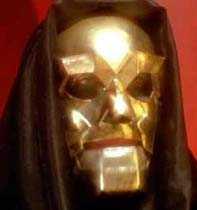It has now emerged that John Prescott was not informed about the controversial loans. He wasn't the only one - the Labour Party treasurer was also in the dark.
One has to wonder why Prescott was out of the loop on such a crucial issue. Just what purpose does the Deputy Leader of a political party serve?
Sunday, March 19, 2006
Could it be David Heath after all?
A few more bloggers are either supporting David Heath or predicting his victory. Hot ginger and dynamite describes him as:
A great performer in the Commons, seemingly well liked by his colleagues and with an unusually good handle on massively important and largely ignored issues, like the tortured death of legal aid in Britain.Meanwhile The Apollo Project notes that the odds on Heath are good, for those who've got in the habit of casting political bets. So could this not widely known man become the Liberal Democrats' Number 2? Or will Lembit Öpik endorse him?
Saturday, March 18, 2006
Howard's Way out
Michael Howard has announced he will be stepping down as an MP at the end of this Parliament. A pity - he will only be 69. In the US Strom Thurmond was still in the Senate when he turned 100!
Guy Fawkes has a good tribute to Howard and there will be others.
I remember the week Howard became leader quite well. The party had been wandering aimlessly, with Iain Duncan Smith being increasingly embattled and no-one could see a way forward. Then IDS fell and many worried that yet another leadership election would just lead to more wrangling and uncertainty.
Instead Howard rapidly established his claims as the candidate who could unite the party and take it forward. After years of despair the Conservative Party finally went on the front foot, taking the fight to Not So Very New Labour. It speaks volumes that Labour were forced to resort to their worn out tactic of getting the party name wrong and claiming the leader was an extreme right winger, rather than offering coherent counter arguments.
Howard did not win the last general election, it is ture, but he made the first advance in seat terms since the mid 1980s. And his final months at leader saw a brilliant strategy of seeing off attempts to force an immediate leadership election and giving the party time to reflect and discuss the way forward. The main legacy of Howard's leadership is the rise of David Cameron. It is a pity will not be in the Commons to watch Cameron from the government backbenches.
But he has made a few mistakes. Why on earth does he support Liverpool?!
Guy Fawkes has a good tribute to Howard and there will be others.
I remember the week Howard became leader quite well. The party had been wandering aimlessly, with Iain Duncan Smith being increasingly embattled and no-one could see a way forward. Then IDS fell and many worried that yet another leadership election would just lead to more wrangling and uncertainty.
Instead Howard rapidly established his claims as the candidate who could unite the party and take it forward. After years of despair the Conservative Party finally went on the front foot, taking the fight to Not So Very New Labour. It speaks volumes that Labour were forced to resort to their worn out tactic of getting the party name wrong and claiming the leader was an extreme right winger, rather than offering coherent counter arguments.
Howard did not win the last general election, it is ture, but he made the first advance in seat terms since the mid 1980s. And his final months at leader saw a brilliant strategy of seeing off attempts to force an immediate leadership election and giving the party time to reflect and discuss the way forward. The main legacy of Howard's leadership is the rise of David Cameron. It is a pity will not be in the Commons to watch Cameron from the government backbenches.
But he has made a few mistakes. Why on earth does he support Liverpool?!
So who will succeed Ming?
He's barely been in the job two weeks but already there are blogs discussing who will succeed Ming Campbell. And Charles Kennedy thought he had it bad!
 Naturally the Deputy Leadership race is attracting a bit of speculation as to how it will influence the eventual leadership succession, though it has to be said that none of the three candidates look like natural choices. Ming's Dynasty: The Battle For The Succession is predicting that Vincent Cable will be "Imperial Regent". But I think he's got the terms mixed up - shouldn't it be Klytus?
Naturally the Deputy Leadership race is attracting a bit of speculation as to how it will influence the eventual leadership succession, though it has to be said that none of the three candidates look like natural choices. Ming's Dynasty: The Battle For The Succession is predicting that Vincent Cable will be "Imperial Regent". But I think he's got the terms mixed up - shouldn't it be Klytus?
 Naturally the Deputy Leadership race is attracting a bit of speculation as to how it will influence the eventual leadership succession, though it has to be said that none of the three candidates look like natural choices. Ming's Dynasty: The Battle For The Succession is predicting that Vincent Cable will be "Imperial Regent". But I think he's got the terms mixed up - shouldn't it be Klytus?
Naturally the Deputy Leadership race is attracting a bit of speculation as to how it will influence the eventual leadership succession, though it has to be said that none of the three candidates look like natural choices. Ming's Dynasty: The Battle For The Succession is predicting that Vincent Cable will be "Imperial Regent". But I think he's got the terms mixed up - shouldn't it be Klytus?
Pressed out?
Whilst randomly scanning several other blogs I've come across this interesting post about newspaper readership & circulations on A Liberal Goes A Long Way.
For the uninitiated the "circulation" for a newspaper is the number of copies sold each day, whilst the "readership" is the number of people actually reading the paper. The National Readership Survey calculates the latter on the basis of a mass survey and is the basis used for selling advertising space so there is a strong vote of confidence in it as an accurate measure from one of the most important quarters. (The NRS website refers to "Great Britain" - I am not sure if it covers Northern Ireland. However that distinction is currently rather more relevant to advertisers than political influences.)
The readership figures for the daily and Sunday papers are as follows (percentage comparisons are with last year):
The Daily Express should frankly be ashamed of itself and I wouldn't be surprised if Lord Beaverbrook is turning in his grave. When doing research for my thesis I have seen many copies of the Express from the late 1930s when it routinely trumpeted its latest increases in sales, at one stage breaking the world record for sales almost every month. Now it is lagging far behind those glory days.
The Independent, Times and Guardian have all substantially increased their sales - is this a continued effect of the "compact" format? And if so, can the Telegraph hold out? (And what will happen to all the readers who despise the compact format?)
(On the issue of the compact format, I have to wonder if it isn't driven more by newsprint costs rather than the often cited problem that commuters find it difficult to fold the paper on the train. When I commuted to school nearly three-quarters of the carriage read a broadsheet each day and it wasn't hard to master the trick of folding the page in half to slide round.)
But it's the message about party support and influence that stands out the most from these figures. ALGALW's analysis has it best:
But the other big point is the general decline in readership. Daily sales have dropped from thirteen to twelve million in the last three years. At the same time digital television has expanded, online newssites are getting even better and larges parts of the public are receiving their news from ever more diverse sources. One has to wonder whether Murdoch really does have the power so many have long attributed to him.
For the uninitiated the "circulation" for a newspaper is the number of copies sold each day, whilst the "readership" is the number of people actually reading the paper. The National Readership Survey calculates the latter on the basis of a mass survey and is the basis used for selling advertising space so there is a strong vote of confidence in it as an accurate measure from one of the most important quarters. (The NRS website refers to "Great Britain" - I am not sure if it covers Northern Ireland. However that distinction is currently rather more relevant to advertisers than political influences.)
The readership figures for the daily and Sunday papers are as follows (percentage comparisons are with last year):
Dailies:Several points immediately stand out. First off is the decline of the Mirror. There was a time when was talking tough about readership being on the up and aiming to challenge The Sun for the top slot. Instead it has declined drastically and is now lagging well behind the Daily Mail.
The Sun = 8,140,000 (-8%)
Daily Mail = 5,640,000 (-2%)
Mirror = 4,150,000 (-11%)
Daily Telegraph = 2,160,000 (-1%)
Daily Express = 1,980,000 (-7%)
The Times = 1,810,000 (+9%)
Daily Star = 1,780,000 (-9%)
The Guardian = 1,220,000 (+14%)
The Independent = 705,000 (+10%)
Financial Times = 391,000 (-10%)
Sundays:
News of the World = 8,630,000 (-9%)
Mail on Sunday = 6,310,000 (=)
Sunday Mirror = 4,570,000 (-6%)
Sunday Times = 3,550,000 (+9%)
Sunday Express = 2,230,000 (+1%)
Sunday Telegraph = 2,040,000 (=)
People = 1,980,000 (-11%)
Observer = 1,290,000 (+11%)
Star = 1,020,000 (-16%)
Independent on Sunday = 788,000 (+18%)
The Daily Express should frankly be ashamed of itself and I wouldn't be surprised if Lord Beaverbrook is turning in his grave. When doing research for my thesis I have seen many copies of the Express from the late 1930s when it routinely trumpeted its latest increases in sales, at one stage breaking the world record for sales almost every month. Now it is lagging far behind those glory days.
The Independent, Times and Guardian have all substantially increased their sales - is this a continued effect of the "compact" format? And if so, can the Telegraph hold out? (And what will happen to all the readers who despise the compact format?)
(On the issue of the compact format, I have to wonder if it isn't driven more by newsprint costs rather than the often cited problem that commuters find it difficult to fold the paper on the train. When I commuted to school nearly three-quarters of the carriage read a broadsheet each day and it wasn't hard to master the trick of folding the page in half to slide round.)
But it's the message about party support and influence that stands out the most from these figures. ALGALW's analysis has it best:
...while it's debatable whether newspapers' endorsements of political parties in reality has much effect... it’s interesting to tot up the numbers.I'm not sure many newspaper readers vote on the basis of editorial endorsements and newspaper circulation drives generally focus on matters other than their political stance. But the media can still write up or write down individuals and parties. Over the next three or four years several of these papers can have a big impact. Constant headlines and major stories about achievements of one party and/or the failures of another do have an impact on shifting public opinion. As has been shown by the Tessa Jowell affair the media often plays a strong role in sustaining a story and keeping it in the public eye.
The Labour Party was supported by five daily newspapers at the 2005 general election (Sun, Mirror, Times, Guardian and FT), with a combined readership of 15,711,000 (56% of total readership). The Tories could count on just three (Mail, Telegraph and Express), with readerships of 9,780,000 (35%).
Rather quirkily, the Star and Independent have this much in common: both declined to endorse any one party (one out of utter disinterest, the other out of split loyalties). The Sundays, far less influential, were slightly more even (51% to 44%), owing to the Sunday Times's tepid support for the Tories.
But these figures illustrate how important is Rupert Murdoch – whose 75th birthday it was last week-end – to Gordon Brown and David Cameron. (I suspect Ming Campbell has probably written off the chances of gaining this senior citizen’s vote.) The 56:35 split in daily newspaper readership figures in favour of Labour could easily be reversed if Mr Murdoch were to decide the Sun (and Times) should switch sides next time, and back the Tories.
But the other big point is the general decline in readership. Daily sales have dropped from thirteen to twelve million in the last three years. At the same time digital television has expanded, online newssites are getting even better and larges parts of the public are receiving their news from ever more diverse sources. One has to wonder whether Murdoch really does have the power so many have long attributed to him.
Friday, March 17, 2006
So who is David Heath?
Following my earlier post and also my post on uk.politics.electoral, one or two more bloggers are starting to talk about the Liberal Democrat Deputy Leadership election.
 Liberal England is backing David Heath, but frankly he has the lowest profile of any of the three candidates. He has only been in the front line of Liberal Democrat spokespersons for a year, but wasn't one of the MPs who publicly forced Charles Kennedy to stand down (of the contenders, only Vincent Cable was), so one wonders whether he would be able to take a stand against incompetence. Perhaps there's more on his website but at the moment one has to wonder why he is considered the best in the field.
Liberal England is backing David Heath, but frankly he has the lowest profile of any of the three candidates. He has only been in the front line of Liberal Democrat spokespersons for a year, but wasn't one of the MPs who publicly forced Charles Kennedy to stand down (of the contenders, only Vincent Cable was), so one wonders whether he would be able to take a stand against incompetence. Perhaps there's more on his website but at the moment one has to wonder why he is considered the best in the field.
Oh and already someone has made the following observation:
Still party elections are always fun (unless one is a candidate backed by Lembit Öpik) and can generate a lot of good material for bloggers so perhaps there is some short-term benefit after all!
 Liberal England is backing David Heath, but frankly he has the lowest profile of any of the three candidates. He has only been in the front line of Liberal Democrat spokespersons for a year, but wasn't one of the MPs who publicly forced Charles Kennedy to stand down (of the contenders, only Vincent Cable was), so one wonders whether he would be able to take a stand against incompetence. Perhaps there's more on his website but at the moment one has to wonder why he is considered the best in the field.
Liberal England is backing David Heath, but frankly he has the lowest profile of any of the three candidates. He has only been in the front line of Liberal Democrat spokespersons for a year, but wasn't one of the MPs who publicly forced Charles Kennedy to stand down (of the contenders, only Vincent Cable was), so one wonders whether he would be able to take a stand against incompetence. Perhaps there's more on his website but at the moment one has to wonder why he is considered the best in the field.Oh and already someone has made the following observation:
But if he wins I suppose we had better be ready for beard & sandals jokes.On a more serious point, can someone explain just what the existance of a formally elected post of Deputy Leader of a political party actually achieves? Other than designating someone to mind the shop if the leader gets run over by a bus (or stabbed in the front by colleagues), what does this post contribute?
Still party elections are always fun (unless one is a candidate backed by Lembit Öpik) and can generate a lot of good material for bloggers so perhaps there is some short-term benefit after all!
Greater ministerial accountability or mere profiling?
Thanks to Mary Reid I've learnt that David Miliband has become the first minister to start a blog.
Sadly Not So Very New Labour have made media management such a fine art form that one invariably asks whether Miliband has genuinely done this in the hope that it will
Sadly Not So Very New Labour have made media management such a fine art form that one invariably asks whether Miliband has genuinely done this in the hope that it will
help bridge the gap - the growing and potentially dangerous gap - between politicians and the publicor is just a means to boost his profile at large for the forthcoming contest to succeed Tony Blair against Old Man Brown. I hope it's the former, in which case this is an encouraging development.
And then there were three...
Nominations for the Liberal Democrat Deputy Leadership election have now closed and there are just three candidates contesting it. The other three previously reported have declined to run and so the Lib Dems are left with:
- Vincent Cable
- David Heath
- Matthew Taylor
Lembit Öpik now has the opportunity to decide which of these three candidates sinks first. So who does Jonah least want?
Thursday, March 16, 2006
The ULU election results are in
Some of you may have noticed that I was recently a candidate in the University of London Union elections. Tonight the results were declared.
 First off a huge congratulation to Vicki Slater, current President of Queen Mary Students' Union, who was elected as President with a huge 783 votes. This election attracted hundreds more votes than any other and Vicki's result is nothing short of spectacular.
First off a huge congratulation to Vicki Slater, current President of Queen Mary Students' Union, who was elected as President with a huge 783 votes. This election attracted hundreds more votes than any other and Vicki's result is nothing short of spectacular.
Congratulations also especially to Rob Park (Chair of Council), Daniel Snowdon (Welfare & Student Affairs) and Laura Purll (Lesbian, Gay, Bisexual & Trans Students' Officer) - all good mates, as well as to Jim Hunkin (Finance, Services & Operations), Michael Neville (Sports & Societies), John Kenchington (London Student Editor), Jennie Cowan (Environment & Ethics Officer), Matthew Mak (Medical Students' Officer), James Juggapah (Men's Officer), Chris Heathcote (Officer without portfolio), Sanchia Smithson (Racial Equaliy Officer), Nicky Grant (Students With Disabilities Officer) and Joanna Fried (Women's Officer).
No doubt over the coming months there'll be more about the team, either on this blog or else in London Student.
The full results are as follows:
 President
President
Tony Percy 272
Joe Robertson WITHDRAWN
Vicki Slater 783 ELECTED
Re-Open Nominations 78
TOTAL 1133
 Finance, Services & Operations
Finance, Services & Operations
Jim Hunkin 378 ELECTED
Razual Karim 311
Re-Open Nominations 47
TOTAL 736
 Welfare & Student Affairs
Welfare & Student Affairs
Daniel Snowdon 455 ELECTED
Re-Open Nominations 144
TOTAL 599
 Sports & Societies
Sports & Societies
Round 1
Louis Appiah 136 ELIMINATED
Mike Neville 251
Sebastian Slater 260
Re-Open Nominations 46
TOTAL 693
Round 2
Mike Neville +56 307
Sebastian Slater +39.00 299 ELIMINATED
Re-Open Nominations +11.00 57
Non-transferable 30
TOTAL 693
Round 3
Mike Neville +203.00 510 ELECTED
Re-Open Nominations +24.00 81
Non-transferable +72 102
TOTAL 693
 London Student Editor
London Student Editor
Round 1
Chaminda Jayanetti 263 ELIMINATED
John Kenchington 312
Re-Open Nominations 50
TOTAL 625
Round 2
John Kenchington +148 460 ELECTED
Re-Open Nominations +41.00 91
Non-transferable +74 74
TOTAL 625
 Chair of Council
Chair of Council
Rob Park 372 ELECTED
Re-Open Nominations 104
TOTAL 476
 Environment & Ethics Officer
Environment & Ethics Officer
Jennie Cowan 333 ELECTED
Rees Howell 194
Re-Open Nominations 45
TOTAL 572
 Lesbian, Gay, Bisexual & Trans Officer
Lesbian, Gay, Bisexual & Trans Officer
Laura Purll 383 ELECTED
Re-Open Nominations 99
TOTAL 482
 Medical Students' Officer
Medical Students' Officer
Simon Lammy 205
Matthew Mak 265 ELECTED
Re-Open Nominations 36
TOTAL 506
 Men's Officer
Men's Officer
James Juggapah 349 ELECTED
Re-Open Nominations 90
TOTAL 439
 Officer without Portfolio
Officer without Portfolio
Chris Heathcote 338 ELECTED
Re-Open Nominations 86
TOTAL 424
 Postgraduate Students' Officer
Postgraduate Students' Officer
Tim Roll-Pickering 359 ELECTED
Re-Open Nominations 87
TOTAL 446
 Racial Equality Officer
Racial Equality Officer
Sanchia Smithson 372 ELECTED
Re-Open Nominations 84
TOTAL 456
 Students With Disabilities Officer
Students With Disabilities Officer
Nicky Grant 370 ELECTED
Re-Open Nominations 60
TOTAL 430
 Women's Officer
Women's Officer
Joanna Fried 423 ELECTED
Re-Open Nominations 82
TOTAL 505
 First off a huge congratulation to Vicki Slater, current President of Queen Mary Students' Union, who was elected as President with a huge 783 votes. This election attracted hundreds more votes than any other and Vicki's result is nothing short of spectacular.
First off a huge congratulation to Vicki Slater, current President of Queen Mary Students' Union, who was elected as President with a huge 783 votes. This election attracted hundreds more votes than any other and Vicki's result is nothing short of spectacular.Congratulations also especially to Rob Park (Chair of Council), Daniel Snowdon (Welfare & Student Affairs) and Laura Purll (Lesbian, Gay, Bisexual & Trans Students' Officer) - all good mates, as well as to Jim Hunkin (Finance, Services & Operations), Michael Neville (Sports & Societies), John Kenchington (London Student Editor), Jennie Cowan (Environment & Ethics Officer), Matthew Mak (Medical Students' Officer), James Juggapah (Men's Officer), Chris Heathcote (Officer without portfolio), Sanchia Smithson (Racial Equaliy Officer), Nicky Grant (Students With Disabilities Officer) and Joanna Fried (Women's Officer).
No doubt over the coming months there'll be more about the team, either on this blog or else in London Student.
The full results are as follows:
 President
PresidentTony Percy 272
Joe Robertson WITHDRAWN
Vicki Slater 783 ELECTED
Re-Open Nominations 78
TOTAL 1133
 Finance, Services & Operations
Finance, Services & OperationsJim Hunkin 378 ELECTED
Razual Karim 311
Re-Open Nominations 47
TOTAL 736
 Welfare & Student Affairs
Welfare & Student AffairsDaniel Snowdon 455 ELECTED
Re-Open Nominations 144
TOTAL 599
 Sports & Societies
Sports & SocietiesRound 1
Louis Appiah 136 ELIMINATED
Mike Neville 251
Sebastian Slater 260
Re-Open Nominations 46
TOTAL 693
Round 2
Mike Neville +56 307
Sebastian Slater +39.00 299 ELIMINATED
Re-Open Nominations +11.00 57
Non-transferable 30
TOTAL 693
Round 3
Mike Neville +203.00 510 ELECTED
Re-Open Nominations +24.00 81
Non-transferable +72 102
TOTAL 693
 London Student Editor
London Student EditorRound 1
Chaminda Jayanetti 263 ELIMINATED
John Kenchington 312
Re-Open Nominations 50
TOTAL 625
Round 2
John Kenchington +148 460 ELECTED
Re-Open Nominations +41.00 91
Non-transferable +74 74
TOTAL 625
 Chair of Council
Chair of CouncilRob Park 372 ELECTED
Re-Open Nominations 104
TOTAL 476
 Environment & Ethics Officer
Environment & Ethics OfficerJennie Cowan 333 ELECTED
Rees Howell 194
Re-Open Nominations 45
TOTAL 572
 Lesbian, Gay, Bisexual & Trans Officer
Lesbian, Gay, Bisexual & Trans OfficerLaura Purll 383 ELECTED
Re-Open Nominations 99
TOTAL 482
 Medical Students' Officer
Medical Students' OfficerSimon Lammy 205
Matthew Mak 265 ELECTED
Re-Open Nominations 36
TOTAL 506
 Men's Officer
Men's OfficerJames Juggapah 349 ELECTED
Re-Open Nominations 90
TOTAL 439
 Officer without Portfolio
Officer without PortfolioChris Heathcote 338 ELECTED
Re-Open Nominations 86
TOTAL 424
 Postgraduate Students' Officer
Postgraduate Students' OfficerTim Roll-Pickering 359 ELECTED
Re-Open Nominations 87
TOTAL 446
 Racial Equality Officer
Racial Equality OfficerSanchia Smithson 372 ELECTED
Re-Open Nominations 84
TOTAL 456
 Students With Disabilities Officer
Students With Disabilities OfficerNicky Grant 370 ELECTED
Re-Open Nominations 60
TOTAL 430
 Women's Officer
Women's OfficerJoanna Fried 423 ELECTED
Re-Open Nominations 82
TOTAL 505
Wednesday, March 15, 2006
Unbelievable
Over on Tory Convert's blog a post about the absurdities of public sector union monopoly practices in France.
A result of French anti-capitalism was revealed in last week's Spectator, in the form of an industrial dispute which bubbled up after the Government decided to give a contract for producing new biometric passports to a private company rather than the state-owned printing company:One can only but rejoice that such an absurd scenario can no longer happen in the UK. Why on Earth does the French Government surrender to trade union militants so easily?In most countries that decision would have been routine but, France being France, a massive row broke out. The state-owned Imprimerie Nationale, the national printers who would traditionally be entrusted with making the passports, were outraged. The company didn’t even own the technology needed to produce the passports, but that didn’t stop the printers' trade union suing. The union bosses claimed that Imprimerie Nationale had a monopoly on passport production. To make sure that the government took notice, a motley crew of communist and socialist activists, local officials — and even an MP — took the law into their own hands and kidnapped the chief executive of the company, holding him hostage for a few hours. Rather than throwing the militants in jail, the spineless French authorities surrendered.
Subscribe to:
Posts (Atom)